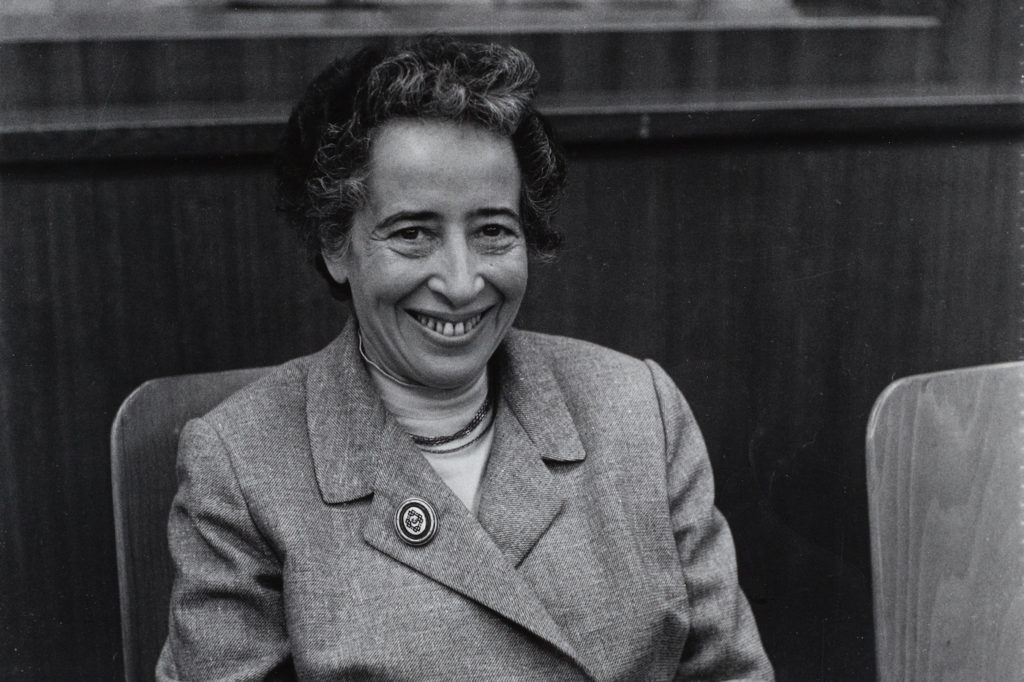This essay is part of Public Discourse’s Who’s Who series, which introduces and critically engages with important thinkers who are often referenced in political and cultural debates, but whose ideas might not be widely known or understood. The series previously considered the life and work of Antonio Gramsci, Jacques Maritain, Michael Oakeshott, Charles De Koninck, and Harry V. Jaffa and Allan Bloom.
In our polarized age, it is difficult to remember that a generation or two ago leading intellectuals were concerned that political life was moribund. As political scientist Louis Hartz argued in his 1955 book The Liberal Tradition in America, serious political difference here was suppressed by overwhelming majority agreement on the principles of liberty and equality. The bitter debates of the 1930s seemed forgotten by modern Republicans, who made their peace with an expanded role for the federal government, and modern Democrats, who temporarily set aside their ambition to expand the welfare state. Meanwhile, foreign policy exemplified a bipartisan norm (promoting the United Nations on the one hand and opposing Soviet expansionism on the other), which dictated that whatever political disputes divided Americans at home were to stop at the water’s edge.
In this context, the case for reviving political life—the vibrant activity of public debate and choice, exemplified by the ancient polis and especially by Athens—was powerfully articulated by Hannah Arendt, who thereby became one of the key figures in the revival of political theory.
Born in 1906 to a Jewish family in Linden, Germany, Arendt studied with Martin Heidegger at Marburg and Karl Jaspers at Heidelberg, and she was then forced to flee to France and later to the United States to escape Nazi persecution. In France and in New York she was active with Jewish organizations to help refugees from the Nazis in Europe and to document their fate. With the publication of her monumental Origins of Totalitarianism in 1951, her literary reputation was established. She remained a major figure among New York public intellectuals for the rest of her life, publishing books with major presses and articles in influential outlets such as Commonweal, Dissent, The New Yorker, and the New York Review of Books, and lecturing at elite universities, with extended appointments at the University of Chicago and the New School for Social Research.
Start your day with Public Discourse
Sign up and get our daily essays sent straight to your inbox.Political Thinking
Arendt is often referred to as a philosopher, or as a leading voice of the New Left of the 1960s and ’70s. Both descriptions are misleading. In fact, she explicitly eschewed the title of “philosopher” in her Gifford Lectures, and while one can find an occasional word of praise for contemporary student activism in an interview, she adhered to no party line. A strikingly original thinker, she might more profitably be understood as developing a phenomenology of politics: she was attuned to the experience of political life and was unconstrained by fixed categories. She rejected on the one hand the ideological character of twentieth-century political movements, while on the other corrected Heidegger’s exclusion of politics from his philosophy. She declared herself an enemy of thoughtlessness in politics—or what she famously described as “the banality of evil”—and sought instead to promote political thinking.
To understand what she meant by this, we might begin by considering her Origins of Totalitarianism, a richly textured study that is at once historical, sociological, psychological, and political. Writing between 1945 and 1949, Arendt analyzes the phenomenon of Nazi Germany and Stalinist Russia in the immediate aftermath of the collapse of the former while the latter remained a looming threat. The book offers an analysis of modernity gone horribly wrong, tracing European antisemitism to the complicated process of Jewish assimilation following the Enlightenment, then analyzing imperialism in the late nineteenth and early twentieth centuries as it emerged from Western racism, itself built on the collapse of nationalism. According to Arendt, totalitarianism arises in the wake of the First World War and its creation of stateless populations, as well as classless mass societies of powerless, politically indifferent, and isolated individuals who do not share common interests or goals. It is a complex phenomenon involving propaganda (particularly the employment of ostensibly scientific language), ideology, elites and sympathizers, secret police, a despotic leader, and terror as a means of control. The thread that runs through her whole analysis is the loss of political engagement, from the satisfaction of the bourgeoisie with their private lives to the evisceration of all privacy and all politics in the totalitarian state.
Totalitarianism is a complex phenomenon involving propaganda (particularly the employment of ostensibly scientific language), ideology, elites and sympathizers, secret police, a despotic leader, and terror as a means of control.
Political Action
While Origins is deeply immersed in historical fact, Arendt’s Walgreen Lectures, published in 1958 as The Human Condition, are more explicitly theoretical, ranging adeptly across the whole tradition of political philosophy. She takes issue with the distinction between the active life and the contemplative life, the vita activa and the vita contemplativa. In particular, she objects both to the classical philosophical view that contemplation is superior to action and to the modern view that favors active life but fails to attend to “distinctions and articulations.” Arendt divides the vita activa into labor, work, and action: the first is concerned with natural necessity and material consumption, the second with art and the building of a human world, the third with politics. She faults modern thought, mainstream and Marxist, for its focus on labor and its attempt through technology to emancipate man from labor without considering what he was emancipated for. The point of work is to build a world for man to live in, a product of art but more importantly an arena for action. Like Machiavelli, whom she cites often and favorably, she wants to restore the polis—the political life its citizens lived—not because the city exists by nature but because political action properly understood shows man at his most noble.
In Arendt’s view, political action happens in relation to others; it involves deliberation and choice, but also competition and courage. It involves common effort—political power arises from joint action, not command—but it also depends on individuals’ preserving their integrity, not losing themselves in a mass or even in a political party. Since the political arena is flexible and fluid, political actors gain honor and remembrance by engaging with changing circumstances and creating something new, not by confining themselves within the limits of custom or by reiterating old laws. Politics shows itself most intensely in revolution and in founding, and those who engage politically in these moments know that as they act together to initiate something genuinely original, they are fully exercising their human faculties.
Political action involves common effort—political power arises from joint action, not command—but it also depends upon individuals’ preserving their integrity, not losing themselves in a mass or even in a political party.
Political Freedom
This is political freedom, according to Arendt, and it seems to be the greatest good. As she observed in her next book in 1963, On Revolution, the chief example of men who understood this were those who made the American Revolution, who sought to institute a novus ordo seclorum and succeeded gloriously—though she concluded that “it was the Constitution itself, this greatest achievement of the American people, which eventually cheated them of their proudest possession,” presumably because it channeled and limited their political energies into highly structured institutions. Still, political freedom is not only for those who are great, even if it is the key to human greatness; it can be found wherever human beings engage in common action to determine their future together.
For Arendt, the modern bureaucratic state and the mass society whose material life it administers had forgotten the value of political freedom. In Eichmann in Jerusalem: A Report on the Banality of Evil, she concludes that Adolf Eichmann, the defendant in a dramatic trial in Israel and a high-ranking Nazi functionary who had escaped to Latin America, showed no extraordinary malice. Instead, he was a recognizable modern type whose identity was constituted by his place in the state bureaucracy and whose sense of duty was defined entirely by success in efficiently fulfilling his bureaucratic tasks. In this sense, political freedom can be seen as the opposite of bureaucratic service: it is responsible, not anonymous; inventive, not compliant; thoughtful, not thoughtless—that is, political freedom is aware of the larger circumstances and choices, and willing to make decisions for which one will be held accountable, earning praise or blame. Arendt’s account of the Holocaust was also condemned for her sharp and unforgiving remarks about the leaders of Jewish ghettoes who cooperated with Nazi officials in sending Jews to the camps. As she saw it, clientelism, like bureaucracy, is a form of corruption, in contrast with the spark of political freedom evident in the Warsaw uprising.
For Arendt, the life of the public intellectual is a political life, particularly in modern circumstances. Although she looks back to the ancient polis, she hardly thinks the exercise of political freedom is restricted to orators in an assembly or hoplites in the field. The independent spirit Arendt showed in her writings—her reluctance to attach herself to a political or intellectual movement, indeed the relish she seemed to take in arguing against the favored opinions of her admirers—exemplified precisely the sort of political action she praised.
She did not disparage philosophy; indeed, in her efforts to reconstruct a political theory from Immanuel Kant’s Third Critique, she was mindful of his appeal to “public reason,” which she agreed was philosophy’s characteristic mode of expression. One might wonder whether her work adequately refutes the classical case for the contemplative life and whether her emphasis on political novelty underestimates the case for constitutionalism. Relatedly, one might ask whether together contemplation and constitutionalism indicate the limits of political freedom—the first by showing politics is not the greatest good, the second by limiting the political realm to leave room for what is higher than politics. Still, to have helped restore the nobility of politics in the face of the modern totalitarian state is an achievement worth remembering and worth the effort to understand.














